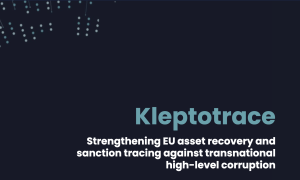In May 2023, the University of Luxembourg joined a consortium covering eight EU member states and more than 30 countries including associate partners, through the KLEPTOTRACE project. This two-year project, funded through the Internal Security Fund (ISF) of the European Union, is built around five concrete actions.
The Luxembourg team, consisting of Prof. Silvia Allegrezza and Postdoctoral researcher Iryna Bogdanova is leading the fourth action of the project:
- Analysing the risk factors of transnational high-level corruption and of the schemes used to circumvent EU sanctions.
- Providing training for EU public authorities, private sector (e.g. banks) and civil society to strengthen anticorruption investigation/intelligence capabilities.
- Developing a data-driven toolbox for tracing and connecting assets related to high-level corruption and sanctioned entities.
- Assessing the current EU sanction regimes and advancing legal and policy recommendations to render them more effective against transnational corruption.
- Boosting public awareness with a dissemination campaign about the risks of ‘kleptocracy’ and of its links with organised crime and illicit financial flows.
In June 2024, the Luxembourg team released the “Report on the limitations of the current EU restrictive measures (sanctions) regimes”, an open source document available for download. In the report the researchers determine the different categories of EU sanctions and their scope, examine the legal framework by which sanctions are adopted and challenged, and analyse the various issues which arise, including a deep dive into the role of human rights.
Discover the researchers’ key findings in a summary slide deck:






